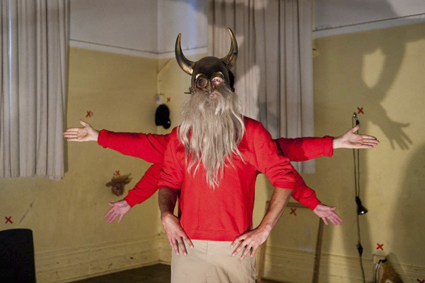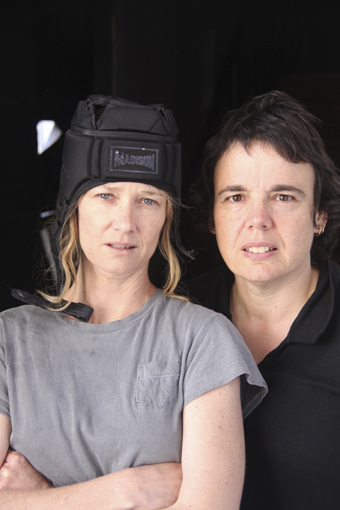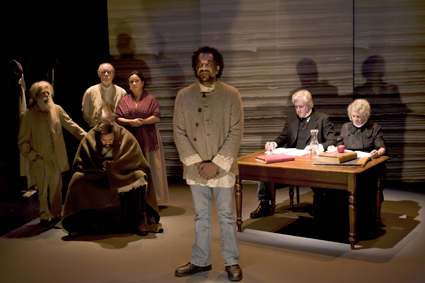ethical ventriloquism
john bailey: recent melbourne performance

Conor Gallacher, James Deeth, Marcus McKenzie, The Economist, MKA
photo Sarah Walker
Conor Gallacher, James Deeth, Marcus McKenzie, The Economist, MKA
SOME OF THE MOST COMPELLING DIALOGUES I ENCOUNTERED LAST YEAR—WHETHER IN PERSON, ON STAGE OR WRITTEN—CENTRED ON ISSUES OF AGENCY AND AUTHORITY IN ARTISTIC PRACTICE. WHO HAS THE RIGHT TO TELL A STORY THAT ISN’T THEIRS, AND TO WHAT RESPONSIBILITIES MUST THEY ATTEND? CAN A GROUP OR INDIVIDUAL OWN AN EVENT, OR IS ALL EXPERIENCE BORROWED? CAN A SENSITIVE, COMPASSIONATE ARTICULATION OF ANOTHER’S VOICE ENACT ANOTHER FORM OF SILENCING?
mka theatre, the economist
The most public of these conversations stemmed from MKA Theatre’s final production for 2011, The Economist. Before the work had even premiered, a slew of outrage arrived from Melbourne’s Herald-Sun newspaper and carried over onto talkback radio. Calls were made to prevent the piece from opening, and its makers were afforded any number of unenviable descriptors in angry letters to the editor. The play, it was alleged, extended sympathy to Norwegian mass murderer Anders Behring Breivik, and drew comparisons between the killer and various right-wing Australian politicians and commentators. It all apparently highlighted the key problem with the arts in Australia, where lefty bureaucrats are happy to throw money at ‘depraved’ artists if their shock tactics further the anti-conservative agenda.
Of course, it was all a media beat-up, and anyone who saw The Economist quickly realised how skewed the commentary had been. Indeed, the piece subsequently received almost universal praise, though this may have been the result of theatre critics’ own sinister position as fifth columnists. But the work was an intelligent and considered piece of theatre, self-conscious of its own tinderbox nature and employing a range of techniques to prevent anyone from interpreting it as anything close to an apologist screed.
The play is largely a faithful biography of Breivik, with little if any editorialising on the part of the playwright. If his motives or mentality bear some correspondence to members of Australian society, it’s mostly left for the viewer to decide. Indeed, the restraint displayed here by writer Tobias Manderson-Galvin—already known for pushing the envelope of taste—is more than admirable, especially given the tendency for much theatre in Melbourne to explain how a particular production is supposed to be interpreted.
Again, though, there’s no sympathy for the devil here. In sticking to the facts, The Economist indicates how Breivik’s story is pathetic, in the vulgar sense, while utterly lacking in pathos. It’s a clinical exploration of the way social rejection is institutionally acceptable, and how an obviously angry, alienated and potentially sociopathic individual can still be accommodated by gun-club camaraderie, videogame violence and the phobic outpourings of likeminded souls in the online fora.
Van Badham’s direction gives the piece the theatrical nuance it really requires, drawing on a raft of post-Brechtian devices to prevent any restrictive readings. The casting is mostly cross-gender, musical numbers interrupt without warning, and the pacing and delivery never allow the work to fall into the trenches of Tragedy or Comedy. It’s essential that this occurs, since The Economist’s proximity to the real events that inspired it means that it would be all too easy to produce something with a mythologising effect. I don’t know that I’d recommend the production to someone with an immediate connection to the recent horrors it addresses, but it does no violence of its own.
strands

Peta Brady, Wilhelmina Stracke, Strands
photo Guido Stracke
Peta Brady, Wilhelmina Stracke, Strands
Peta Brady’s Strands presents a different conundrum. The story traces somewhat familiar ground—two sisters negotiate their relationship after the death of their mother, upon whom one sister was emotionally and physically dependent. Their respective futures must be determined—one’s supposed freedom will mean the other is placed in a care facility, but the relinquishing of responsibility may itself be a kind of psychic imprisonment eternally re-enacted by the daughter unable to resolve her estrangement from her parents.
It’s a two-hander featuring a character with an intellectual disability. Given the abundance of outstanding actors with perceived disabilities in Australia today, is it problematic to cast an abled actor in the role and risk denying employment to someone whose opportunities on the stage are already unfairly limited? I think so, with qualifications. Brady is clearly sensitive to the tricky territory she navigates here, and there is never a sense of privilege co-opting the marginalised for the sake of drama. This is no Forrest Gump or Rain Man. More importantly, disability isn’t merely gestured to here; whatever the reality behind the production, its fictional world produces sincere insights into the complexities of living with a disability, while working this into a narrative that is never itself defined by that disability. It’s not patronising, and the excellence of the production itself goes some way to alleviating concern. But, for me, it’s not an entirely comfortable work.
ilbijerri theatre, coranderrk

Coranderrk: We Will Show the Country, Ilbijerri Theatre Company
photo Steven Rhall
Coranderrk: We Will Show the Country, Ilbijerri Theatre Company
Ilbijerri Theatre’s Coranderrk: We Will Show the Country tackles a debt of yet another kind—that of the contemporary theatre maker to real figures whose names are inscribed on the historical ledger. The solution seems an austere one: the text of the play is entirely sourced from the minutes of a court case in the 1880s, which might sound tiresome but in fact proves an elegant and engaging strategy. As popular culture so often reminds us, a pared-back version of a legal case follows a classic narrative structure, at first introducing characters and a central problem, moving through arguments and counter-arguments, introducing new twists and complications and eventually reaching a conclusion of some sort.
Coranderrk’s story centres on the 19th century Aboriginal reserve of the same name, at which displaced peoples from all over the country were welcomed and which had established itself as a self-supporting community with the help of a white preacher, John Green. Local authorities sought to gain control of the reserve for their own purposes, however; Coranderrk’s inhabitants eventually took the case to parliament and an official inquiry commenced.
While the script carefully follows the historical record, the production itself ingeniously builds upon its verbatim style. The performances shift between strictly realist and a more heightened style, and the lighting design often switches register into a dreamlike, meditative state. The ultimate effect is far from polemic, but provides an intriguing window on a past we share but from which we are also estranged.
taxi
Patricia Cornelius’ Taxi, directed by Susie Dee, offers an angle on the tiny tales which occur all around us but into which we’re rarely given an intimate view. Its audience of three is positioned in the back seat of a cab, which then travels across various suburbs picking up and delivering a broad array of characters. From the moment the first passenger hails the car, the world outside transforms such that any random passerby may potentially become the focus of the next segment of story, and for this reason each person on the street suddenly becomes a locus of narrative possibility.
Each passenger offers a riveting glimpse into the unsettling reality taxi drivers face daily— from a jovial bloke who does a runner to the silent Vietnamese woman carrying the empty baby blanket to the partygoer too drunk to get out of the car, the driver’s role is at once counsellor, guardian, police officer, confessor, servant and potential threat. While there are official rules in place to handle these scenarios, the lived reality proves far more complicated.
It was wonderful fortune to realise that one of my fellow audience members was a cab driver himself, and when the piece was finished and we were deposited back at our initial launching point, I asked him for his own thoughts on the experience. He was quick to note where our driver had broken protocol, explaining which story moments could never have occurred in actuality, but these criticisms were delivered with great professional pride. They didn’t detract from the work at all, but allowed him to assume an authority rarely permitted during his own working day. In the end, he said, the show was a creative response to his lived reality and, beaming, it was clear how much he appreciated the chance to see that reality from a comfortable back seat perspective.
MKA Theatre, The Economist, writer Tobias Manderson-Galvin, director Van Badham, performers Marcus Mckenzie, Zoey Dawson, James Deeth, Conor Gallacher, Sarah Walker, Peter Paltos, designer David Samuel, sound design Nick McCorriston, lighting Julia Knibbs; MKA Pop-Up Theatre, Nov 29-Dec 16; Strands, writer Peta Brady, director Sue Jone, performers Wilhelmina Stracke, Peta Brady, designer Belinda Wiltshire, La Mama Theatre, Dec 1-18; Ilbijerri Theatre Company, Coranderrk: We Will Show the Country, written and adapted by Andrea James, Giordano Nanni, director Isaac Drandic, performers Syd Brisbane, Jack Charles, Jim Daly, Peter Finlay, Greg Fryer, Liz Jones, Tom Long, Melodie Reynolds, Glenn Shea, La Mama at the Courthouse. Nov 16–27; D & Associates/Big West Festival, Taxi, writer Patricia Cornelius, director Susie Dee, performers Rodney Afif, Angus Cerini, Ananth Gopal, HaiHa Le, Amanda Ma, Nicci Wilks and special guests, visual media Tamsin Sharp, composer Ian Moorhead, Bluestone Performance Hub, Footscray, Melbourne, Nov 16 – 26, 2011
RealTime issue #107 Feb-March 2012 pg. 34-35






